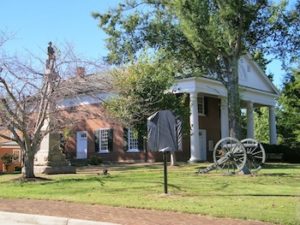
Joseph Holmes courthouse
murder scene
*The birth of Joseph R. Holmes is celebrated on this date in 1838. He was a Black shoemaker, farmer, and politician.
Holmes published various articles critical of conservatives after the American Civil War. After being emancipated from Charlotte County, Virginia, he married Mary Clarke. They had three sons and one daughter. On October 23, 1867, Holmes and Edward Nelson (also African American) were elected to represent Charlotte and Halifax Counties in the Virginia Constitutional Convention of 1868.
Holmes defeated former Confederate and Virginia Supreme Court justice Wood Bouldin and was one of the Black delegates most ridiculed in the conservative press. The convention finished its work and approved a constitution on April 17, 1868. The provisions disenfranchising former Confederates were controversial, and the constitution needed voter approval at a forthcoming election (which did not happen until July 1869).
In March 1869, Holmes attended a convention of Republicans in Petersburg, Virginia, representing his locality. On May 29, 1868, Holmes bought 11.5 acres of land in Charlotte County near Keysville. He wrote letters to the local Freedman's Bureau agent, advocating the establishment of a school in Keysville, Virginia. On the morning of May 3, 1869, John Marshall, son of white Judge Hunter Holmes Marshall, reportedly threatened to kill Holmes and Blacks active in the Republican Party and shot a black man (who survived).
That afternoon, Holmes went to the Charlotte County Courthouse, and Marshall thought he would seek a warrant against him. A confrontation occurred on the courthouse steps in broad daylight before a large crowd, and Holmes (who was unarmed) was shot dead. John Marshall, Griffin S. Marshall (his brother), William Boyd, and Macon C. Morris were charged with his murder. The grand jury refused to indict Griffin Marshall; all four fled and were never brought to trial.
The incident was widely reported across the U.S. and overseas. Holmes is presumed buried on the land he had bought, although only the receipt for his burial survives. Long-lost witness accounts of the incident were discovered at the Charlotte Courthouse in 2012.